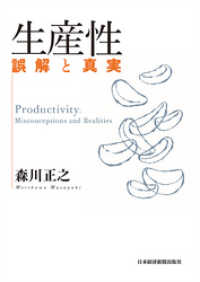- ホーム
- > 洋書
- > 英文書
- > Business / Economics
Full Description
Public management literature has often debated the usefulness of transactional leadership. Some scholars are concerned that transactional leadership strategies will harm public employees' perceived competence (ie: their self-efficacy), but in fact there are also arguments for the opposite result - that feelings of competence are strengthened by conditional rewards, because they provide feedback about performance. This study explores how 91 high school principals' reported use of rewards and sanctions affect perceived professional competence among their 1,921 teachers. The results show that the use of rewards strengthens self-efficacy, and that the use of sanctions does not seem to have negative effects. Furthermore, the teachers' self-efficacy can be linked positively to organisational performance. This suggests that rewards can be an important tool for managers in the public sector.NER(01): GB IE








